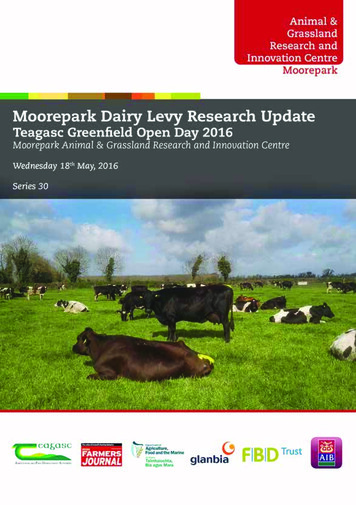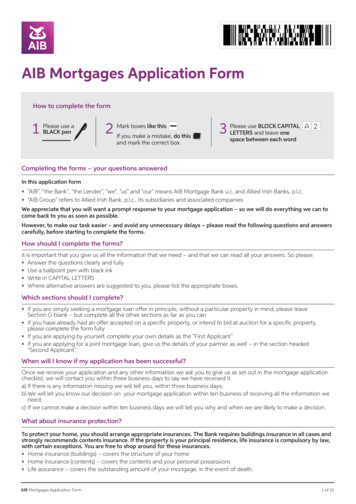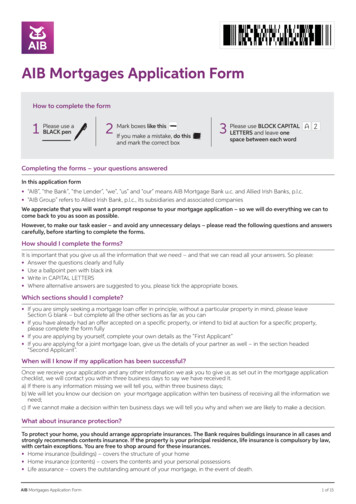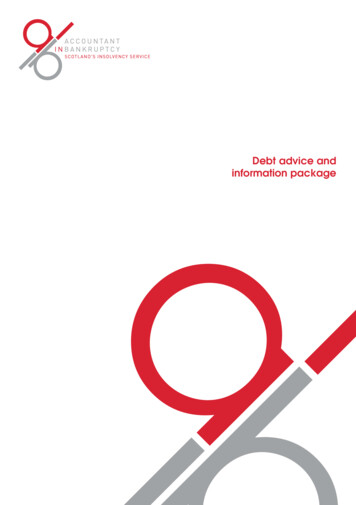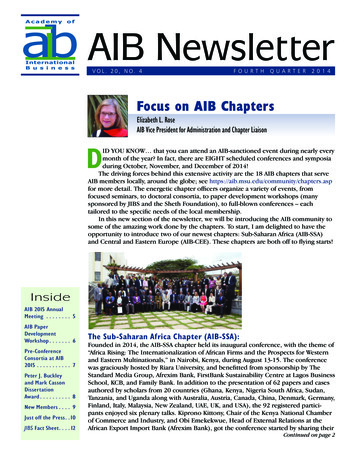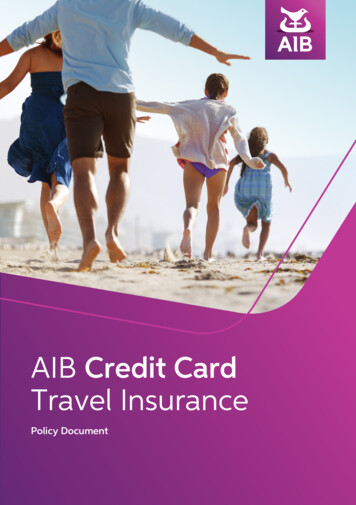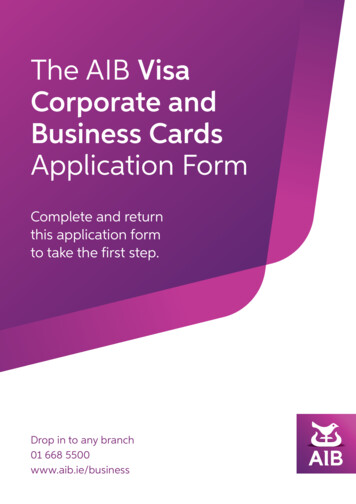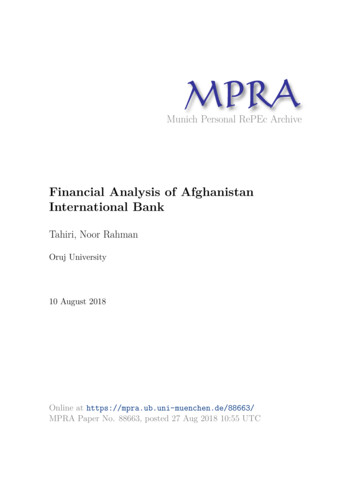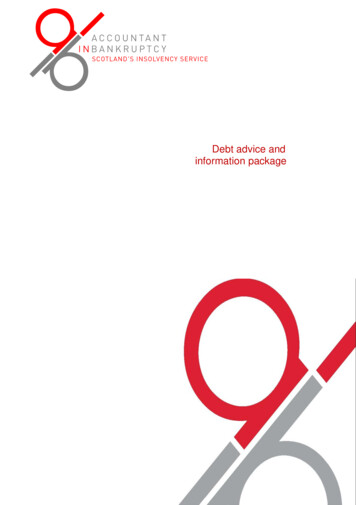
Transcription
Debt advice andinformation package
The contents of this publication are accurateas at 30 November 2016. Any subsequentamendments will be incorporated in thelatest version which is available at:www.aib.gov.uk/guidance/publicationsYou can get more copies of this booklet, orcopies of other booklets we produce, byphoning us on 0300 200 2600You can also find them on the publicationspage of our website: www.aib.gov.ukThis publication is available on request incommunity language versions and alternativeformats. Please contact 0300 200 2600 for thisto be arranged.
Debt Advice and Information PackageYou have been given this booklet because one of thefollowing is happening or is about to happen: Someone that you owe money to is using a legalprocess to get back what you owe to them; or Someone that you owe money to intends to ask thecourt to make you bankrupt; or You have discussed entering a trust deed with aninsolvency practitioner; or You have discussed the issue of a Certificate forSequestration with an authorised person.The law says information about where to get debt andmoney advice must be provided to you before furtheraction can be taken. This booklet contains importantinformation about getting advice to help you deal withyour creditors and your debt.Do not ignore this informationIgnoring your debts can lead to serious problems for you.You could lose your possessions, including your homeand savings, or be made bankrupt. Getting moneyadvice as soon as possible can help you to deal with yourdebts and your creditors and may help you to improveyour situation.3
You are strongly advised to seek money advice.If someone has provided you with this booklet, action isbeing taken, or is about to be taken, against you.Who can give me help and advice?You can get free money advice in your area.There are a number of people who can give free,confidential, and impartial money advice face-to-face inyour local area. Some organisations may also giveinformation and advice over the telephone or online.People that can give free, face-to-face advice includeadvisers at Citizens Advice Bureaux and local authoritymoney advisers.You can find a local, free money adviser by contacting:Money Advice Scotland0141 572 scotland.org.uk4
You can find your local Citizens Advice Bureau bycontacting:Citizens Advice Scotland0808 800 9060www.adviceguide.org.uk/ScotlandOther organisations that can give free advice include:StepChange Debt Charity0800 138 1111www.stepchange.orgNational Debtline0808 808 usiness Debtline0800 197 f you do not have access to the internet your local librarymay be able to provide free access.You can also get advice from insolvency practitioners.You should ask if they will charge you for their initialadvice or for any other work they may do in connectionwith your debts. The Institute of Chartered Accountants ofScotland (ICAS) on 0131 347 0100 or at www.icas.org.ukand The Insolvency Practitioners Association on 020 76235108 or at an help you find an insolvency practitioner in your area.5
You can also contact a solicitor, a financial adviser or aDebt Management Company. They will probably chargeyou a fee. You may be entitled to legal aid to help withthe cost of a solicitor.Whoever you ask for money or debt advice, make surethat the person you speak to knows you live in Scotland.What can they do for me?People who provide debt and money advice can look atyour personal situation, discuss the options available toyou and help you decide which is the best course ofaction for you.You may also be given information on how to maximiseyour income or deal with emergencies. For example,they may discuss whether you are entitled to benefits andwhat you can do if your bank account is frozen, if yourgas or electricity is cut off or if you are facing eviction.A money adviser can help you deal with your creditors.They may also help you with applications to court andrepresent you at court hearings.6
What can I do about my creditors and debts?Most importantly, do not ignore your creditors or yourdebts.If you take action as soon as possible there may be waysto improve your situation. Your options may include: Making informal arrangements with your creditors; Arranging for extra time to pay what you owe; Setting up a statutory Debt Payment Programme, Entering a trust deed; or As a last resort, applying for your own bankruptcy.You will have to pay an application fee for this.A money adviser can help you decide what to do, giveyou advice about all of the above options and tell you ifthere are more options for you. They can also tell youabout the consequences of any of these options.7
The consequences of not dealing with yourdebtIf you have been provided you with this booklet, one ofthe following is happening or is about to happen:1. Someone that you owe money to is using one ofseveral legal processes called diligence to get backwhat you oweIn Scotland, there are a number of legal processes thatpeople you owe money to (your creditors) can use to getback what they are owed. These processes are knownas diligences and are usually carried out by sheriffofficers on behalf of your creditors.These are some of the diligences that can be used: Your employer can be instructed to make deductionsfrom your wages. This is known as arrestment ofearnings.Your bank can be instructed to freeze funds in yourbank accounts and to release those funds to yourcreditor after 14 weeks. This is known asarrestment.Someone who has goods belonging to you can beinstructed to freeze them. The goods can later beremoved and sold at auction. This is also known asarrestment.8
Your creditor can ask a sheriff officer to secure someitems in your possession. This is known asattachment. The items can later be taken away andsold at auction. Goods inside a dwellinghouse canonly be attached in exceptional circumstances.Sheriff Officers can be instructed to take away moneyin your possession through money attachment.Your creditors can register an inhibition to preventyou disposing of your home or other property thatyou own.When using most diligences, creditors are required bylaw to provide you with this booklet.2. Someone that you owe money to intends to askthe court to make you bankruptYour creditors can ask the court to make you bankrupt ifyou owe them 3,000. They must provide you with thisbooklet.In Scotland, sequestration is the legal word forbankruptcy.Bankruptcy has serious consequences. It will affectyour credit rating, make it difficult for you to get credit inthe future and can affect your employment or futureemployment.9
Your bank may freeze or close your bank accounts.Bankruptcy can lead to the loss of your home, vehiclesand other possessions.If you are made bankrupt, control of your assets (thingsyou own), such as your home, car, savings and otheritems, is automatically passes to your trustee who maysell them to pay your creditors. Your trustee is theperson responsible for overseeing your bankruptcy.3. You have discussed entering a trust deed withan insolvency practitionerIf you sign a trust deed, you enter an agreement with atrustee who will administer the trust deed. You mustco-operate with your trustee. You agree that control ofthe things you own, including your home, car, savingsand other items passes to your trustee who may sellthem to pay your creditors. You usually also agree topay a regular from your wages or other income.If enough of your creditors agree to the terms of yourtrust deed, it can become protected. As long as youkeep to what you have agreed, your creditors are notallowed to take further action against you.Insolvency practitioners are required by law to provideyou with this booklet if you are about to set up a trustdeed with them. They must give you this booklet beforeyou sign the trust deed.10
4. You have discussed the issue of a Certificate forSequestration with an authorised personA Certificate for Sequestration certifies that you areunable to pay your debts as they become due. You canuse the certificate to support an application for your ownbankruptcy.Authorised persons who can grant a certificate includemost money advisers, insolvency practitioners and somepeople who work for insolvency practitioners.The authorised person must tell you about all the optionsavailable to you and must provide you with this bookletprior to granting you the Certificate for Sequestration.11
Further informationFurther information booklets are available for debtors andcreditors, on trust deeds and on bankruptcy restrictions.A booklet called “Debt and the Consequences” givesyou more information about what can happen if you donot deal with your debts or your creditors. It also tellsyou more about the options that might be available toyou.You can get all of these booklets from the Accountant inBankruptcy online at www.aib.gov.uk. You can alsorequest a copy by e-mail at aib.gsi.gov.uk or bytelephoning 0300 200 2600.AiB also provides further information about bankruptcy,trust deeds, the Debt Arrangement Scheme and the legalprocesses known as diligences on their website atwww.aib.gov.uk.12
Using your personal informationPersonal information that you supply to the Accountant inBankruptcy (AiB) may be used in a number of different ways toenable AiB to act in accordance with the Bankruptcy (Scotland) Act2016 and other relevant legislation. For example: to determine bankruptcy applications and Debt ArrangementScheme (DAS), DebtPayment Programmes (DPPs); for the collection of fees and contributions; to identify and sell assets; to supervise the administration of bankruptcies, Protected TrustDeeds and DPPs, and for statistical analysis purposes.In order to complete these statutory duties and tasks, we do need tocollect and, process personal information about you and sometimesabout third parties. In certain circumstances, we may share personalinformation with others, for example: our agents; banks; creditreference agencies; creditors and local authorities.If you are made bankrupt, sign a Trust Deed, apply for a DAS, DPPor register a moratorium, your details must be recorded in a publicregister, which is available for anyone to access, free of charge. Ifyou are made subject to Bankruptcy Restriction Order (BRO), detailsof your BRO will also be recorded on the AiB website.We, or an agent acting on our behalf, may contact you to discussyour experience of using our services, as part of our on-goingcommitment to improve customer service. If you do not wish us tocontact you for this purpose, please let us know.Our full Privacy statement, that details how we process personalinformation and your right to request to see, amend or delete,information that we hold about you, is published on our website:www.aib.gsi.gov.uk. If you wish a copy of our Privacy Statement,you can write to us, email us at: aib@aib.gsi.gov.uk, or phone us on0300 200 2600 and ask to speak with our Data Protection Officer.
This booklet is for general guidance only.It is not a detailed or full statement of the law.
Bankruptcy online at www.aib.gov.uk. You can also request a copy by e-mail at aib.gsi.gov.uk or by telephoning 0300 200 2600. AiB also provides further information about bankruptcy, trust deeds, the Debt Arrangement Scheme and the legal processes known as diligences on their website at www.aib.gov.uk. 12
